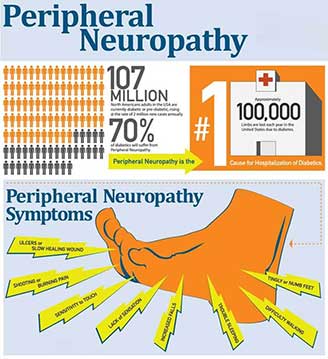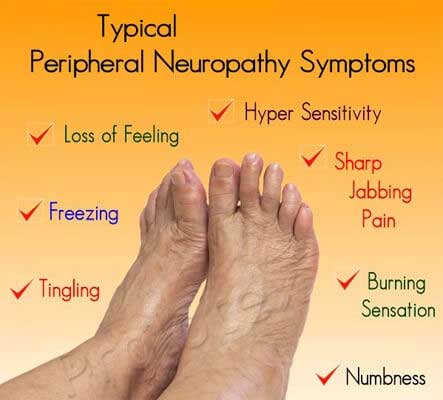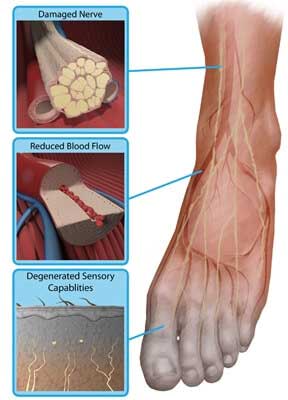Peripheral neuropathy describes damage or disease affecting nerves which may impair sensation, movement, gland or organ function, or other aspects of health, depending on the type of nerve affected.



Peripheral neuropathy in diabetes is related to the sugar levels in the blood, and can sometimes be the first symptoms that present. Patients complain of burning sensation in their feet and pins and needles in their hands, known as ‘glove and stocking’ anaesthesia meaning the alteration in sensation is seen or the hands and feet. In addition, patients may have alteration in certain neurological signs such as the reflexes and muscle tone. Treatment of diabetic neuropathy primarily involves aggressive management of diabetes and good blood sugar control.
Individuals who consume large amounts of alcohol on a regular basis can develop peripheral neuropathy. The primary reason behind this is the loss of vital vitamins especially vitamin B6 and B12. These vitamins are responsible for the health of nerves and low levels can result in varying symptoms such as tingling, numbness and burning sensation in the hands and feet. The treatments are alcoholic peripheral neuropathy often involves complete abstinence from alcohol along with high-dose vitamins either administered as an intravenous drug or in the form of tablets.
Symptoms vary, depending on which types of nerves are affected. Common signs and symptoms may include gradual onset numbness and tingling in the feet or hands, burning pain, sharp, jabbing or electric-shock-type pain, extreme sensitivity to light touch. Individuals may experience muscle weakness or paralysis if motor nerves are affected, or heat intolerance and bowel/bladder or digestive problems if autonomic nerves are affected
Peripheral neuropathy is not a disease, but rather a symptom with many potential causes as described above. Diagnosis of underlying cause is obtained through a comprehensive medical history and examination. Certain tests that may be helpful include blood tests, imaging studies, nerve conduction studies. These will provide sufficient information to identify the cause of the peripheral neuropathy
In all the above cases, one main goal of treatment is to manage the condition causing the neuropathy. If the underlying cause is corrected, the neuropathy often improves on its own. Another goal of treatment is to effectively manage the painful symptoms. There are numerous powerful analgesics such as anticonvulsants medications and antidepressants that can be used in managing this condition. In addition, the use of lidocaine sprays and patches are useful as well. There is some evidence to support the use of opioids such as Morphine or Oxycodone, however their use can lead to dependence and addiction, so these drugs are generally only prescribed when other treatments fail.
The best way to prevent peripheral neuropathy is to carefully manage any medical conditions that may put you at risk.
This information is for educational purposes only and is NOT intended to replace the care or advice given by your physician. Always seek the advice of your physician or other qualified health provider before starting any new treatment or with any questions you may have regarding a medical condition. For more information see our Medical Disclaimer.